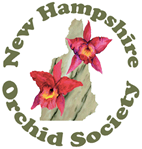 |
The list below contains links to local orchid societies and to nationwide orchid societies that we are affiliated with.
You will also find below a list of vendors who attending our most recent orchid show and speakers that attended recent meetings. Whenever possible links are provided so that you can reach out to them in the future. Please help us show our appreciation to these vendors by shopping with them for your future orchid and orchid supply needs.

| American Orchid Society | American Orchid Society's mission is to promote and support the passion for orchids through education, conservation, and research. Publisher of monthly "Orchids" magazine. | |
| Amherst Orchid Society | Meetings are usually held on the second Sunday of each month in Amherst, MA (except February, August and September) | |
| Cape & Islands Orchid Society (CAIOS) | Meetings are usually held the second Sunday of each month in Falmouth, MA (except July and August) | |
| Connecticut Orchid Society (COS) | Usually meets the second Wednesday of each month alternating between Unionville and Cheshire, CT (except July) | |
| Maine Orchid Society |
Meetings are usually held the second Monday of each month in Gorham, ME (except July and August) | |
| Massachusetts Orchid Society | Meetings are usually held the second Tuesday of each month in Winchester, MA | |
| Nutmeg State Orchid Society (NSOS) | Usually meets the first Sunday of every month in Unionville, CT (except August) | |
| Ocean State Orchid Society (OSOS) | Usually meets the second Saturday of each month in East Greenwich, RI | |
| Orchid Digest | Orchid Digest has delivered orchid information for over 80 years with a website and quarterly magazine |

| Ecuagenera Orchids | Ecuador, Germany, USA | |
| Fair Orchids | Hillsborough, NJ | |
| Frosty Hollow Orchids | Vineyard Haven, MA | |
| J&L Orchids | Easton, CT | |
| Kelley's Korner Orchid Supplies | Etters, PA | |
| Mason Hollow Nursery | Mason, NH | |
| Ten Shin Orchids | Yuanli, Taiwan | |
| Oceanside Orchids | Oceanside, CA | |
| White Plains Orchids | White Plains, NY |

| Paph Paradise | Dave Sorokowsky presented a talk: Don't Fear the Slippers on November 9, 2024 | |
| New World Orchids | Kristen Uthus presented a talk: Cattleya Relatives: The Miniature Collection on July 13, 2024 | |
| Gold Country Orchids | Alan Koch presented a talk: Species Habitat and Orchid Culture on June 8, 2024 | |
| Waldor Orchids | Beth Davis presented a talk: What is a Beth Plant; Welcome to the Weird, Wacky World of Orchids on May 11, 2024 | |
| Windswept in Time Orchids | Edgar Stehli presented a talk: Miniatures on September 9, 2023 | |
| Sunset Valley Orchids | Fred Clarke presented a talk: Becoming an 80 Percentile Grower on July 8, 2023 | |
| Oceanside Orchids | Tim Culbertson presented a talk: Modern Sarcochilus Hybrids on June 10, 2023 |

